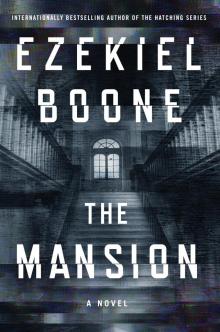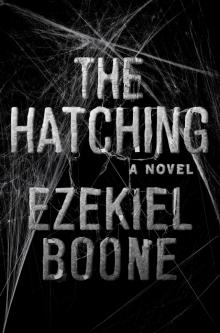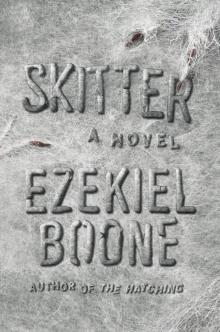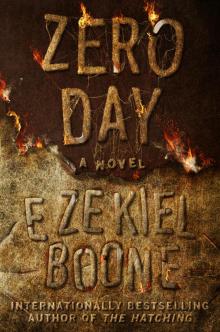- Home
- Ezekiel Boone
Zero Day Page 6
Zero Day Read online
Page 6
“Yeah, yeah.” Melanie was impatient. “Just keep going.”
“So the question isn’t why do they lay eggs in about ten percent of the survivors, but why do the other ninety percent get left completely alone? And the answer is: to feed the big spiders.”
Julie shifted to a picture they’d gotten from an infestation in a rural village in Japan. Without context, it wouldn’t have meant much. The picture showed a silky cocoon that was dotted with black specks. But the context was everything: the scientist who’d snapped the photo had been able to take fairly accurate measurements. The black specks were actually the spiders with red stripes on their backs—each one the size of a small grapefruit—and the cocoon was huge. The size of a pickup truck. The video also seemed to show that the reason the spiders were crawling on the cocoon was to feed it: the spiders grazed on the silk-wrapped bodies of men and women unfortunate enough to have been bitten, paralyzed, and wrapped up, and then delivered nutrients to the giant cocoon.
Julie gently closed the lid of the laptop. “Anyway, I was thinking about the order of things. We’ve spent so much time just figuring out what they were doing that we haven’t really had the bandwidth to focus on why they were doing it. But I kind of thought, okay, they seem coordinated, and even the way they clear the area surrounding their infestations shows that the cocoons are of supreme importance. I mean, maybe it doesn’t make much sense from a modern perspective, when four or five miles isn’t that far, but back in the day, if you could clear a swath four or five miles around something, that was a pretty effective buffer.”
Melanie could feel it clicking. She was following along with Julie and jumping forward. The key, she realized, and what Julie was getting to, was that there was a reason the spiders seemed like they worked together. She was just about to say that, breaking her promise to stop interrupting, when Julie spoke again.
“Do you hear that?”
“What?” Melanie listened for a second. She heard tapping and something muffled from the glass enclosure, and she saw that Laura was waving to her excitedly. “Guess they found something.”
“No,” Julie said. “Outside.”
“Oh. The shouting. Yeah, seems like something has the military folks in a tizzy.”
“Not the shouting,” Julie said. “Listen.”
So Melanie did. And after a moment her eyes widened. “Are those gunshots?”
USS Elsie Downs, Atlantic Ocean
Amy sighed. “You really want to start watching Breaking Bad?”
“I’m not the one who insisted we take the last two seats on the evacuation helicopter. Besides, I’ve never seen it, and you and Shotgun and Gordo always talk about how it was the best show ever on television and blah, blah, blah.” Fred was sitting on the floor with Gordo and Amy’s chocolate Lab, Claymore, curled up next to him, his head on Fred’s lap. Fred was massaging the great lunk’s ears, and every so often Claymore would let out a deep, throaty sigh of contentment.
They’d been given a private cabin to share. No matter that it was clearly designed to have one occupant; Amy was smart enough to realize just how precarious their position was here aboard the aircraft carrier. She and Fred were civilians with no special skills. Her husband and, more important, Shotgun might have value, and the scientists whom they’d shared the helicopter ride with certainly had value, but if push came to shove, she and Fred—and Claymore—were expendable.
Because of that, other than their popping out for meals, she’d insisted to Fred that they lie low. It was not something that came naturally to Fred, and it meant that they’d spent a lot of time watching movies and television shows. Fortunately, the carrier had a seemingly inexhaustible media library.
“But Breaking Bad?” Amy said. “You don’t want to watch something lighter?” She looked down at her lap. She had her satellite phone on but hadn’t gotten a text from Gordo yet that day. She was pretty sure that Fred hadn’t gotten a text from Shotgun on his satellite phone either. Neither of their husbands was of the “Just checking in” variety. It didn’t stop her from worrying, though. Reluctantly, she powered it off. She’d check again before she went to sleep.
“You’ve been telling me for years that I need to watch it, and this seems as good a time as any,” Fred said, sounding pouty. “It’s not like there’s anything more exciting going on.”
“Why don’t we go pop into the lab and see if we can do anything helpful?”
“Please, girl. Like what? I mean, if Melanie needs somebody to throw a party, well, then. But what kind of real help are we going to be?”
“Please?” Amy could hear that she sounded a little whiny. She didn’t like it, but she was stressed-out. Being stuck in this tiny cabin, watching television for hours on end, didn’t help. “It would be good for Claymore to get some exercise.”
“Really?” Fred raised an eyebrow skeptically. “The lab is just around the corner. It’s, like, a hundred feet.” But he was already getting to his feet.
She threw her sat phone into her purse, slipped the purse over her shoulder, and grabbed Claymore’s leash. “Who’s the best dog in the whole world?”
Claymore, who’d stood up when Fred did, wagged his tail as an answer. Amy stepped out into the hallway and was immediately bumped into by a young woman running full tilt. It was a glancing blow, barely anything, but it startled her. More surprising was the soldier’s reaction: the woman didn’t slow down. Didn’t apologize. Nothing.
Amy watched her disappear around the corner and then let it go. Whatever.
She and Fred and the dog walked to the corner and for a second she was convinced she’d gone the wrong way. The lab should have been three doors down, but there were no guards. There were always guards standing outside the lab. As she was thinking this, a pair of sailors carrying rifles ran past her and she heard something like popcorn popping.
Oh.
She walked quickly to the lab door and knocked urgently. Claymore stood next to her, panting and happy to be out of the room, apparently not worried about whatever was happening.
“Was that—”
“Not now, Fred,” she said.
The door opened cautiously, and Amy was relieved to see Dr. Nieder’s face. “Laura,” she said. “I think we better come in.”
USS Elsie Downs, Atlantic Ocean
For a guy who prided himself on being able to read the room, to figure out the political winds so that he was ahead of the pack, Manny had sure missed this one. And it hurt. Literally. As in: he was on a helicopter, winging out over the Atlantic Ocean, on the run, and getting medical attention because he’d been shot. Aside from the injury to his pride from not having seen it coming, the actual physical injury was pretty unpleasant.
The Secret Service agent tending to him, a woman named Agent Cutbert, assured him that, as far as gunshot wounds went, it was minor—but it was still a gunshot wound, and in Manny’s very limited experience, which was limited to this particular gunshot wound, even a minor gunshot wound hurt a lot.
Things had gone from normal to tense to everything turned completely upside down in what felt like a very, very short time.
He had noticed that there seemed to be more aides than normal in the conference room, but that hadn’t been his main preoccupation. The meeting that morning had been really rough. A lot of yelling. It wasn’t that unusual to have heated disagreements. There was a certain amount of observed decorum at any meeting with the president, but there was also a certain amount of fiery rhetoric. You didn’t have the kind of career that let you attend meetings with the president if you weren’t willing to argue for what you wanted. The first meeting of the day, however, had been spectacularly uncivil. After putting up with it for nearly an hour, Steph had essentially needed to shout over everybody to restore order. She’d adjourned the meeting at least partially to give Manny time to go talk to Melanie and see if she had anything new.
Time. There was never enough of it.
The plan for the most recent meeting was to try
to stall. Melanie had told him that if he could give her just a little more time—time they didn’t have—she thought she would have something. She was making progress, she insisted.
To that end, he and Steph had decided to start the meeting with a brief on civilian casualties both short-term and long-term directly related to the thirty-one strikes on major infestation points. They were going to put a particular emphasis on the damage caused by nukes, on what they’d destroyed. The hope, of course, was that it would serve as a proactive measure to blunt Broussard and his crew. But as Manny stood to call the room to order, Ben Broussard hijacked everything. Broussard was at the far end of the conference room, with a huddle of aides surrounding him. No, not a huddle, Manny thought. A posse.
“We’ve run out of time. You’re not doing enough,” Broussard accused. He was pointing his finger across the room at Steph in what seemed like an inappropriate way to address the president.
“You missed the opportunity to contain this when it first hit our shores,” he said. “That was the moment when you should have acted. If you’d taken Los Angeles off the map, none of the rest of this would have happened.”
Alexandra Harris, the national security advisor, spoke up, her voice dry. “It wouldn’t have helped Europe or Asia or Africa.”
She was sitting at the far end of the room, too, near Broussard, and he wheeled on her. “Screw Europe, and screw Asia and Africa. I’m talking about the goddamned United States. And you,” he said, turning back toward Steph, “you own this. Even if the Spanish Protocol was the right decision, it came too late, as did the decision to use every tool at our disposal.”
“You think I waited too long to use nuclear weapons on American soil?” The president did not appear to be particularly fazed by Broussard’s aggression. She’d had a breather that afternoon, between the two meetings, but Manny knew she was seething.
“Darn right,” he said. “You waited too long. As it is, I had to twist your arm to get you to buy into the Spanish Protocol. Better than nothing, but not by much. Typical.” He was almost spitting the words out. The anger he was showing toward Steph was astounding. Sure, Manny had seen people furious at Steph, but you didn’t act like this in front of the president. He didn’t understand why none of Broussard’s aides were attempting to calm him down.
Broussard continued. “This has gone on too long. You’re going to do what you should have done in the first place. You’re going to order the air force to turn everything, and I mean absolutely everything, west of minus seventy-four degrees, into rubble.” Manny watched Steph motion to an aide, who whispered in her ear, while Broussard kept going. “Those things can’t spread more than a few miles on their own. The mistake you keep making, over and over, is being too soft. Trying to save too many people. It’s a typical civilian mistake, thinking that patience always pays off. Maybe in diplomacy, but you can’t negotiate with these critters. They’re like a damn tumor. The only solution is to cut it out. If you lose some good with the bad, that’s the price you have to pay to contain it. If you want to save the patient, you need to order the surgery.”
Broussard’s face had turned red, and by the end, he was nearly yelling.
Manny was not surprised to see Steph stand up like the president she was. She had never been the kind of woman to roll over.
“How dare you?” Her voice was dark and dangerous. For an instant Manny actually felt sorry for Broussard. But only an instant.
“How dare you say that so glibly? So casually? That’s the price you have to pay? You’re talking about American citizens here. You’re talking about hundreds of millions of souls. You can dress it up however you like, call it a tumor, try to make yourself feel better by saying minus seventy-four degrees, but my god!” She turned and pointed at one of the aides. “Pull up a map. Pull up a map of the entire country with longitude and latitude. Pull up a damn map!” And if Broussard had nearly been yelling, Steph had gone fully past nearly. She was shouting at Broussard.
Manny could feel an unpleasant spark of static start through the room while they waited for the frantic aide to get a map up on the screen. Something was off, but he couldn’t quite put his finger on it. Why didn’t Broussard seem cowed by having his commander in chief screaming at him?
“There,” the president said, stabbing a finger at the screen. “That’s what you’re talking about. New York City. That’s minus seventy-four degrees. You’re proposing we destroy everything west of New York City. Look at that map. What the hell is left of America if we do that? Enough is enough. We need to take the information from Dr. Guyer—”
Broussard cut her off, an act that in normal times would have been almost unthinkable. “You mean Manny’s wife.”
“My ex-wife,” Manny said, “who happens to be a brilliant scientist who has spent her entire career studying spiders, and who is working with several other PhDs who have spent their careers studying spiders; so unless it’s too hard for you to imagine a woman being smart, how about you listen for a second?”
Broussard glowered at him. The rage on his face was so transparent, it made Manny suddenly thankful that there were other people in the room. Not that Manny was a coward, but he was a realist. He was good at politics and throwing verbal punches, not physical ones. Although, judging by the way Broussard kept looking at him, it was quite possible Broussard was thinking knives and guns rather than fisticuffs. That was not the problem of the moment, however, so Manny continued.
“Look, the point that the president is making is that we have already sacrificed nearly two-thirds of the country. It’s the same point she made—a bunch of us made—this morning. We’re having the same argument over and over again. You need to listen, Ben. We can’t just keep bombing the heck out of stuff in the hopes that maybe the spiders take the hint and head on home. Sure, the nuclear strikes so far have been, quote, unquote, ‘clean,’ but give me a break. The truth—”
“The truth,” Broussard shouted, “is that you’re a goddamned politician. Both of you are goddamned politicians,” he yelled, pointing at Manny and Steph, “and you need to let the military do its job! And its job is to win or die trying!”
The room was deathly quiet.
Stephanie leaned forward, her palms on the table. “It is up to me to tell you what your job is, Chairman. Your job is not to win or die trying, as you seem to think. Your job is to do as you are told by your commander in chief. Our goal is not to win, and it sure as hell doesn’t include ‘die trying.’ Our job, and the order I am giving, is to survive. The priority isn’t wiping out the spiders—the priority is ensuring the ongoing survival of the human race; and if we can’t do that, then we’ve lost, no matter what you think. And since you seem incapable of understanding that, you are relieved of your command. We’ve already lost too much to these monsters as it is. I am the president of the United States of America, and I give the orders. As long as I am the president, we are not going to cede another inch. We are going to fight, but we aren’t going to die trying.”
Broussard looked around the room quickly, seeming to count.
It gave Manny a sick feeling in his stomach. Like he was falling off a building.
Broussard nodded. “The key thing that you said there, ma’am, is, ‘as long as I am the president.’ That’s a fixable problem.”
Behind Broussard, two men, one white and no older than twenty-five, the other black and middle-aged, pulled out their pistols. Manny felt, rather than saw, movement around him. Heard shouting.
Broussard had his sidearm out now, and maybe another eight or ten people with pistols seemed to be with him. As swiftly as they drew their weapons, however, the three Secret Service agents drew theirs.
One of the agents, a Latino man Manny didn’t recognize, swept his arm across Steph’s body, moving her behind the agents, and then Billy Cannon, the secretary of defense, who’d been sitting near Manny, drew his own gun and stood shoulder to shoulder with the Secret Service agents. The members of the military who recognized what
was happening but were not part of Broussard’s group, another half dozen people, formed up with Billy and the Secret Service agents. There were maybe fifty or sixty people in the room all told, and at least half of them had no clue that a coup was under way.
The room suddenly felt small.
It certainly felt dangerous.
Manny did the math and couldn’t figure out how they were going to get out of there without bloodshed. He didn’t understand. Was Broussard really so arrogant that he thought he could pull this off? Did he really believe that as soon as he made his move everybody would come to his side?
Would they?
Manny wanted to throw up. Had he missed the way the wind was blowing? Was this just Broussard losing his mind, or was it something more? Was the military so against Steph now, so deeply committed to the idea of a scorched earth, that Broussard knew he’d already won?
He didn’t know. But, looking at Broussard, Manny could tell that the man thought he could pull this whole thing off without firing a shot.
Broussard was wrong.
Alexandra Harris pushed her chair back and stood up. She took a step forward until she was directly in front of Broussard.
“What the hell are you doing, Ben?” Alex said, reaching toward his gun. “You need to respect—”
Manny wondered if the gun would have sounded as loud if the room hadn’t contained the shot so that it echoed and echoed. Somehow he suspected it would have sounded just as loud even outdoors. It was loud enough that he wasn’t even sure he heard the gunfire that followed.
He saw it, though.
As Alex’s head snapped back, a red mist opening like an umbrella in the middle of the room, there was a bloom of light from the muzzle of one of the pistols held by the woman standing next to Broussard. One of the Secret Service agents to Manny’s right stumbled backward, and then the spark of gunfire returned.
Chaos.
The men and women surrounding Broussard scrambled to find cover. Manny was knocked back in his chair, spinning away from Broussard. There was screaming and the noise of gunfire. He saw three bright blooms of blood on the chest of a short black sailor wearing her dress uniform. She had close-cropped hair and a look of surprise on her face, as if the red on her chest were a bouquet of flowers instead of the end of her life.

 The Mansion
The Mansion The Hatching
The Hatching Skitter
Skitter Zero Day
Zero Day